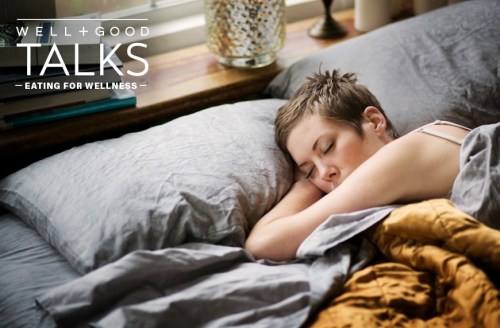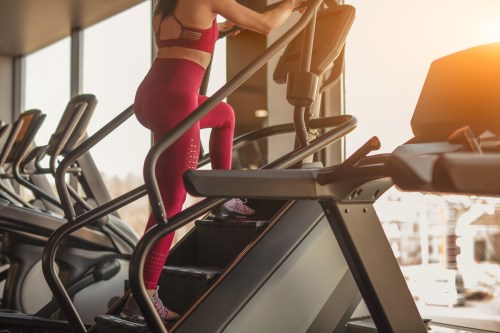If you’re having trouble sleeping, you’ve probably tried everything: no tech before bed, changing your bedroom lighting, noshing on some sleep-inducing snacks, the whole nine yards. However, functional medicine doctor Mark Hyman, MD says it’s worth giving your eating habits some thought, too.
“Your brain chemistry and hormones are controlled by what you eat, and learning how to eat in a way that regulates those things is really key so that your energy is even,” Dr. Hyman said at a recent Well+Good TALKS event celebrating the launch of The Well+Good Cookbook. (Which, BTW, includes a whole guide on how to eat for better sleep.)
What exactly are some ways to better optimize your eating habits for sleep? Here, Dr. Hyman and integrative medicine doctor Marvin Singh, MD, share their tips.
1. Eat the majority of your food earlier in the day, not at night
If you’re in the habit of eating lightly in the morning and afternoon and then whipping up a big meal for dinner, Dr. Hyman says you may want to re-evaluate how you’re distributing your food intake. Overloading your stomach at night means your digestive system has to work hard at breaking down food when the body should be resting.
Dr. Singh adds that if possible, you want to avoid eating two to three hours before you go to bed for this very reason. “We want the digestive system to rest and clear out so that it can clean up and reset for the next day,” he says. “We also want to avoid and reduce the risk of having acid reflux or heartburn and if you fill the tank before you lie on [your] back, you are more likely to have this.”
2. Incorporate some carbs into your evening meal
When you have dinner, Dr. Hyman says adding foods that make you sleepy, like some carbs, could prime your brain for better rest. “It can help by [aiding in] releasing serotonin,” he says. One food to try: brown rice, which contains GABA—a.k.a. gamma-aminobutyric acid—which calms the nervous system and can help promote sleep.
3. Resist that late afternoon cup of coffee or sugary snack
Hitting up the Starbucks happy hour may be beneficial in the short-term, but Dr. Singh says it’s going to work against you after hours. “Caffeine can negatively impact melatonin, which is a hormone that your brain naturally produces to induce sleep,” he says. “If you are having trouble falling asleep or getting good quality sleep, cutting out that cup of coffee may be one of the most important things you can do!” Besides caffeine, Dr. Hyman says eating sugar late in the day or evening can have a similar effect. If you want something sweet at night, reach for a banana, which is linked to better sleep.
4. Have a glass of tart cherry juice
Dr. Singh’s good sleep secret weapon? Tart cherry juice. “Research shows that drinking this before bedtime could help improve sleep and reduce symptoms of insomnia,” he says. “Although it may not be entirely clear why tart cherry juice helps, some feel that it could be due to some if its anti-inflammatory properties and its effect on boosting melatonin.”
5. Avoid drinking alcohol too close to bed
It’s a misconception that a nightcap is good for sleep. “Drinking alcohol may help you feel sleepy and help you fall asleep faster, but it’s going to end up interrupting sleep,” Dr. Hyman says. Sleep expert and psychologist Shelby Harris, PsyD, previously told Well+Good that she avoids drinking within three hours of when she wants to go to bed to protect her sleep.
Here are some more tips on how to sleep better. If you have untraditional work hours, that can affect your sleep too.
Sign Up for Our Daily Newsletter
Get all the latest in wellness, trends, food, fitness, beauty, and more delivered right to your inbox.
Got it, you've been added to our email list.











